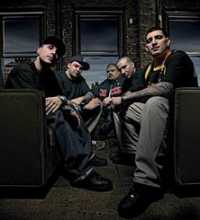While punk rock spent the better part of the '90s enjoying a revival of sorts, hardcore music-punk's louder, faster, street cousin-spent the decade burgeoning underground, where it's always been. But where some of the era's better-known punk groups reveled in their youth and determination to stay young, hardcore's introspective tenor encouraged its stalwart descendants to walk brazenly in the opposite direction. Enter Hazen Street: the sound of New York City hardcore's second generation getting older, wiser, and clearly more experienced.
" People have been calling us a hardcore supergroup and they haven't even heardus yet," says Toby Morse, one of two vocalists for the New York-slash-Los Angelesquintet. "I mean, yeah, we met in that world and that's where we come from. Thelyrics are real, it's street-there's nothing synthetic. But we're all grown menand we all listen to different kinds of music. In our other bands, certain thingsjust wouldn't work. But with Hazen Street, it's anything goes. Throw it on thetable and we'll try it."
Comprised of current and former members of H20, Madball, Box Car Racer, and the legendary Cro-Mags, Hazen Street's line-up reads more like a veteran hardcore roll call than a brand new band adding unique relevance to the punk lexicon. But make no mistake: On the group's debut self-titled album, Morse-along with fellow vocalist Freddy Cricien, bassist Hoya, guitarist David Kennedy, and drummer Mackie - successfully outstretches the confines of traditional hardcore, fusing their street punk history with elements of dub, hip-hop, metal, and a reverence for pop hookery that translates into genuine emotional resonance.
" Hardcore is what got me involved in music," explains Cricien, a 28-year-oldwho has spent over a decade fronting New York City hardcore loyalists Madball, "butas the project progressed, I realized I wanted to try different stuff. Usually,when people hear something catchy, they think of happy-go-lucky lyrics or songsabout broken hearts. Our stuff is upbeat and melodic, yeah, but the content canbe really gritty at times."
Indeed, "Everywhere We Go (Trouble)" serves as a vivid tribute to New York City's historic street culture and "In Memory Of" marks the scars built up from friends and family lost in the struggle. But it's "Fool The World"-a song that deftly separates fantasy thug life from its urban reality-that finds the band at its most vulnerable when Cricien reveals a recent sentence at Rikers Island, the New York correctional facility whose East Elmhurst address went on to christen Hazen Street.
" As a name, Hazen Street symbolizes the fact that I don't ever wanna go backthere," Cricien insists. "I'm telling stories in the music, yeah. But I'm tellingthem with a sense of humility. This is not about flash or exploitation. I wentin at a time when I was living recklessly; I was careless. But I didn't reallylearn as much as I should have, because I got out and I went right back intothat lifestyle. After some time, I got stabbed for the second time in my life." Hepauses, and then continues. "I thought the next thing would be that I was gonnaget killed or that I was gonna have to do some real time. I've been given a lotof chances, but I knew that if I kept rolling the dice, I was bound to lose atsome point. So I turned it around."
And turn it around he did: Conceived as a project between Morse and Kennedy during an H20 / Box Car Racer tour early last year, the Hazen Street line-up solidified almost instantly when the tour came through New York's Hammerstein Ballroom, where Freddy and Hoya signed on. Mackie, whose stint with Fun Lovin' Criminals carried a hefty overseas commitment, was the last person to join-if only because he was the most difficult to track down. With only a clutch of rehearsals and an impressive demo under their belt, the band eventually signed with D.C. Flag-the new imprint headed up by Good Charlotte's Joel and Benji Madden and distributed by Epic-and went to work on the album with seasoned producer Howard Benson (P.O.D., Papa Roach, Sepultura). Not bad for a band that had yet to play their first live show.
" We took Howard Benson to see a Madball show in Los Angeles," Cricien recalls. "Thefirst thing he said to me afterward was, 'I stayed for the whole show.' He neverstays for the whole show. Working with Howard was definitely a learning experienceon both sides. His help opened us up to trying different things; he got me actuallysinging rather than just yelling. I mean, hey, I'm no Pavarotti," he muses, "butmaybe I've got a little Sinatra after all."
Having already carved out such a strong identity in only a short amount of time, Hazen Street are poised to give hardcore culture the public face its never really had - sophisticated and streetwise, refined and resilient. Just don't call it a "hardcore supergroup."
" There's a small world of people who know who we are, but Hazen Street mightgo to a world that doesn't know what hardcore is," Morse concedes, noting themusical divide between Hazen Street and the bands they grew up with. "But thisis an opportunity to teach kids where we come from, who we are. I mean, I'vebeen touring since 1989; Freddy has been touring since he was nine years old.This is our life. But I still want people to see Hazen Street for what it is-asa whole new band."
Source: http://www.hazenst.com/
